回国了,当然要带家人见识一下我的老家季庄,虽然父母现在住在县城里。
我算是70后,虽然有时会讨厌这种笼统的归类。我1971年出生于季庄。1984年,做民办教师的母亲转正,我们开始吃公粮,成了我从懂事起就羡慕的“非农业”。好像是1985年,我们搬到了镇上的四中去住,真正地离开了季庄这块土地。所以我的童年和部分少年是在季庄度过的。
季庄的变化真大。在2003年回去时,和故乡一别已是八年了。我小时候住的草屋,已经被翻盖成了平房,爷爷奶奶的草屋变成了大瓦屋。村子里的不少草屋,由于主人出去打工,都闲置或荒废掉。父母还告诉我,如果建新京沪高速铁路的话,会经过我的村庄。
感觉季庄变小了很多。小时候到家北的小店打酱油或到菜园里揪菜,到西南湖(注:湖在这儿是家乡话,地的意思)割草,记得好像要走一段时间的。现在好,一抬脚的功夫就到了。后来我和几个朋友同事谈起这个问题,不少人有同感。来自美国南方的黑人朋友卡尔说小时候个子矮,走路慢,当然觉得远,另外,一些相对于我的新盖的房子也会造成距离感的错觉。一个西班牙的同事深有同感,他的观点是:去的地方多了,见的人多了,无形中就会觉得家乡小了,尤其是自己的家乡本来就不大。
到家后,父母带着我一家三口到东北湖祖父的坟地去烧纸。
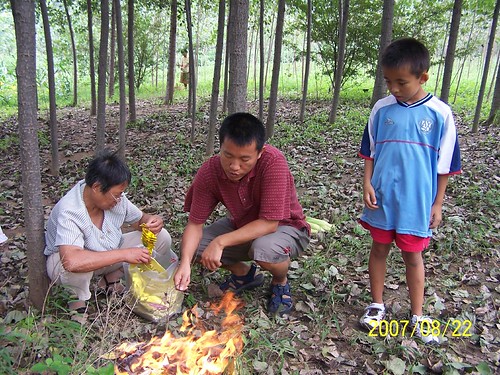
Grandma died in May this year. She was cremated and buried here as well. My dad erected a tablet stone here, so it is easier for later to identify, instead of the earth mounds here and there.
由于这次是老婆和儿子第一次来中国,所以我们把我的五个姑妈都叫到了季庄,一起吃顿饭,见见面。庄里的老乡大都是第一次见到白人,感到很好奇。他们都说儿子长得英俊,但很遗憾,不像妈妈那样白,黑铁蛋一样的皮肤,和我一样。我哈哈一笑了事。老婆不是哗众取宠之人,微笑着供别人观赏评论。有的乡亲走到很近看。孩娘过后跟我和孩子自嘲说她是荷里活的大腕,过了把星瘾。
我奶奶听说老婆家只有姐妹二人,无后,那怎么行?就让我翻译给太座,交待我要做岳父的儿子,并邀请岳父到季庄来安度晚年。她说:“你看看,咱家里有吃有住,多好!”
我奶奶是个有点奇怪的女人,1909年左右出生,小脚,好像十四岁左右过门,生了五个闺女两个儿子,大儿子不到十岁夭折。她和剩下的唯一的儿子,也就是我父亲,的关系不好,也不疼孙子。和那一代的大部分人一样,她是文盲,但喜欢学识字,开荒种地。我出生时,由方圆几十公里的唯一的接生婆接生。我是老小,有两个哥哥,出娘胎后,我趴在席上,奶奶走来,给我翻了个身,看了一眼生殖器:“哼,又是个小子!”,悻悻地走开了。她做的烤辣椒子调咸菜非常好吃。奶奶在2008年5月去世。想想奶奶这一代人的历史和经历,不胜唏嘘。奶奶比邓小平只小五岁左右,是一代人。
奶奶的堂屋:
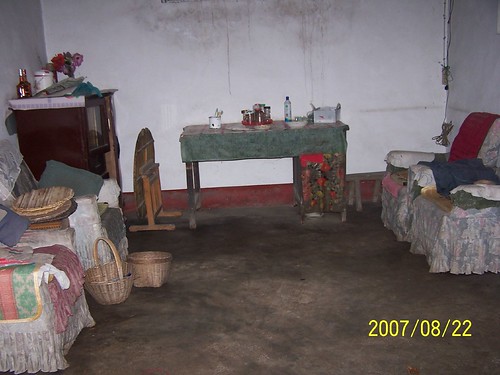
左上角的那个五斗橱好像是我爸在农校工作时学校给打的。
这个我和我奶奶啦呱的过同,就是以前我爸妈和我们兄弟三个住的三间草屋。过同是家乡话,门房的意思。不过当时不是过同,因为我们和爷爷奶奶是分家过的。当时爷爷奶奶的院门儿在东边儿。
那天我们在集上买了不少菜,自己做。靠墙的小棚子是厨房。我坐在那儿烧锅。要说烧锅 我算是老手了。因为用的是柴禾,所以不用拉风箱。很遗憾,忘了给风箱拍个照。
我们做的饭菜很丰盛,味道也好。但第二天,至少是我们夫妻俩口子开始拉肚子。据小孩娘和我的推断,这个病情是菜刀造成的。那天吃完饭,我们重新修盖被最近雨水冲毁的鸡窝。盖鸡窝的砖头有点大,需要把一些敲成小块才能码齐,但我们又没有工具。家人就用菜刀的刀背来敲砖。鸡窝垒完了,那刀随便被冲一冲就用来切西瓜,就这样病从口入了。
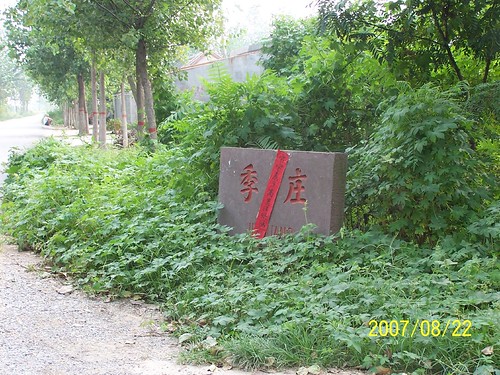
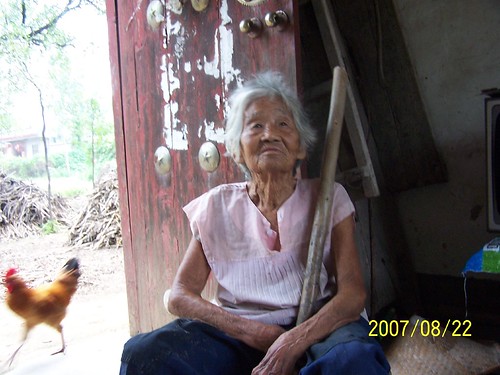
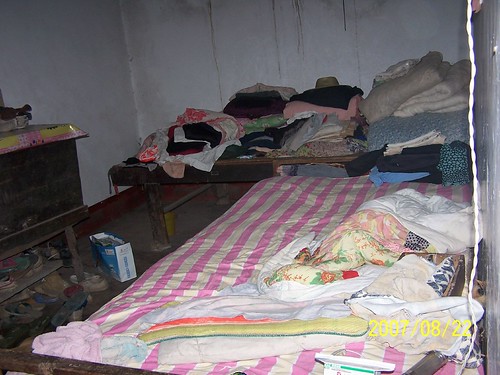
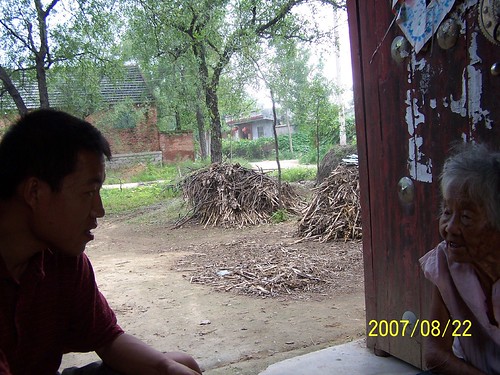
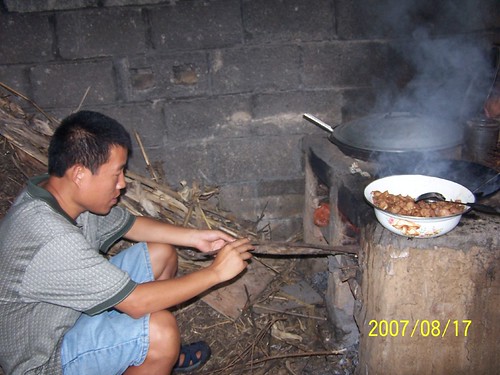
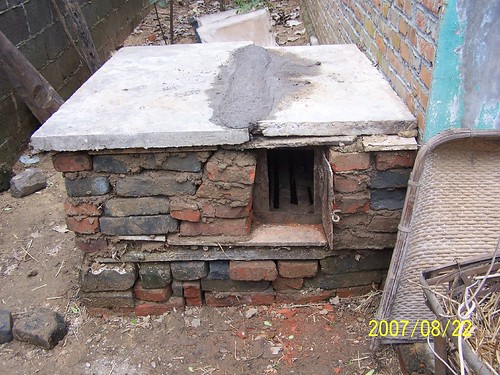
6 responses to “2007年夏故国行流水帐之七 — 回季庄”
You’ve got me pondering. And my pondering got too long to leave as a comment, so I made it a post on my own blog.
Beautiful post, though, and I love the photos. Actually, the photos look surprisingly similar to rural Yanqing County, in Beijing’s northwest. I wouldn’t’ve expected that of Shandong.
I actually planned a longer post, but was short of time and energy, and probably clicked the publish button a tad too soon without better reorganizing and proofreading.
During the week we were at 薛城, we went back to the Ji Village twice, and I actually got the wrong picture (the burning stove one) in describing the day when the clan had a reunion of sort. We were pressed for time, but it was nice for my grandma and my wife to meet each other, and for her to see my son. It was difficult to talk to her, as she was around 97 then. I actually would have loved to be able to sit down and drink some tea together with her, and just listen to her life stories. I will certainly do more of that with my parents.
I am not sure if you’ve read Pearl Buck’s The Good Earth. I read it recently, and really enjoyed it. The book’s subjects were early 20th century peasants in northern Anhui province, maybe a little older than my grandma, and I thought a lot of her descriptions were poignant and accurate.
I am becoming a somewhat history buff. At the present I just got started reading Edward Said’s Orientalism (萨伊德 东方主义). It’s a bit long winded, but I like it so far. In writing this post, I am very much in line with his thinking expressed thusly: “My two fears are distortion and inaccuracy, or rather the kind of inaccuracy produced by too dogmatic a generality and too positivistic a localized focus.” I don’t want to be misanthropic, either.
I probably got some other 错别字, but 过通 should definitely be 过同. Here 同 takes the same meaning as in 胡同.
Yep, read The Good Earth, and it reads like its northern Anhui perhaps neighbouring parts of Shandong or northwestern Jiangsu. There’s something in the geography of the book that suggests that. It’s not really surprising, considering Pearl Buck’s China life was centred around Jiangnan and ventured north of there with her missionary/agronomist husband.
Summer before last I spent a week alone with my in laws, the Mrs was on a work trip, and it was awesome, over dinner sitting back and listening to my father in law tell all the old tales. I would like to do the same with my own parents, but I suspect my family history, on both sides, is a bit too fragmented for much coherent to come through.
Ha, I remember one time I was stuck in Sweden due to visa issues in January. It was just me and my father-in-law. That was interesting time, in a good way. I imagine my guardian angel had a few laughs looking from above.
很喜欢你写的这篇文章。令我很想念我婆婆的乡间生活。我只是在学校放假时才有机会探望她。不过呢,我婆婆还是外婆都不是很疼我这个孙女,因为我们因爸爸工作的关系,办到很远的地方去。所以婆婆们对于我来说,是非常陌生的人物。更不用说公公和外公了,他们两都在我父母很小的时候去世了,我根本没有机会见到他们。连长成甚麽样子的我也不知道。迷糊中,可能还有一点我外公蒙胧的印象,因为我妈给我看过外公的一张小照片。好啦,我不该在这里罗罗嗦嗦的。呵呵。谢谢分享哦。
谢谢你的评论,小青蛙!
一点都不觉得你啰嗦。感觉对自己家庭成员的经历了解越多,对自己的了解也越多。你的婆婆和外婆家都是出生在大马的华裔吗?我在福建厦门大学读书时,知道一些菲籍和大马来的华人到我校读书。
很欣赏你的部落格。你中文书画的功底很深厚呀!今天给老婆看了你的那个Tomatoes菜谱,看到她对瑞典那些原料的熟悉,好亲切。